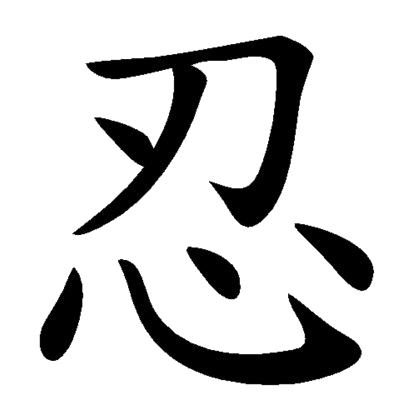
忍 is a popular Chinese moto. It could mean “endurance” or "tolerance". It is widely seen as a virtue by the Chinese. Howver, 忍 could be the cause of “cowardice” and “callousness”, two of the fundamental problems of China, according to Bertrand Russell.
忍 (pronounced as "Ren") is a popular moto in Chinese societies. The Chinese character 忍 can be seen on posters on many desktops in many offices. 忍 means to endure or to tolerate. It means not reacting to something that one does not like or does not approve of.
One elaboration of "忍" is: "忍一時風平浪靜,退一步海闊天空。"
The literal translation is:
"By tolerating for a moment, one could see the wind and sea calm down;
by taking a step back, one could see the open sea and sky."
Endurance could enable one to pause for a moment under adverse situations, instead of reacting to impulse. A pause could potentially enable one to see others' points and react calmly and rationally. Tolerance could give one the strength needed for recovery under adverse situations.
Every time one tolerates something that one does not like or does not approve or, one accumulates a certain amount of negative emotion. If one tolerates all the time, not just temporally, one could accumulate a substantial amount of negative emotions. Bottled up negative emotions often find their way out. If a society as a whole accumulates a substantial amount of negative emotions through tolerance, social norm could be changed.
Endurance and tolerance could be an excuse to not reacting to injustice. Suppose there is a gangster in the community. Standing up against the ganster could get oneself hurt. The game theoretical optimal strategy may be to tolerate the ganster. However, unless someone in the community decides not to tolerate the ganster, this sub-optimal situation of being bullied all the time will remain.
Switching off one's feeling could be an effective way to endure pain, physical or mental. This is necessary when pain becomes too much to bear. However, enduring one's own pain could lead to being insensitivity to sufferings by others. Most societies cultivate compassion, but 忍, being seen as a virtue, could be a counter force to compassion.
忍 could encourage cowardice and callousness. Bertrand Russell (1922) observed that two major problems with China in the 1920s were cowardice and callousness (the third problem being “avarice”). Russell believed that these problems were serious obstacles to China's social development. 忍 is perhaps being respected more than it should be by the Chinese.
The Chinese character 忍 is made up of two parts: the upper half is 刃, which means "blade"; the lower half is 心, which means "heart". So 忍 is putting a blade on one's heart. It cannot be a very pleasant experience. Some Chinese see self-deprivation as a good way, if not a necessity, to train oneself mentally.
[End]
References: